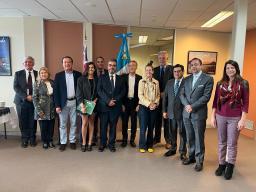Saul Cunningham and participants at the briefing with Latin American Ambassadors, Photo by Noel Campbell
On 23 March ANCLAS co-hosted with the Fenner School of Environment and Society a briefing of Latin American Ambassadors on the strengths and capacities of the School and the opportunities for collaboration with partners in Latin America on themes of mutual interest.
The Director of the Fenner School, Professor Saul Cunningham, noted that most scientific research is dominated by researchers from Europe and North America whose focus is generally on the northern hemisphere. Tropical and southern ocean influences meant researchers in Australia and the countries of Latin America had a different perspective in terms of geography, climate, and demography. He cited research on bushfire management, conservation strategies, habitat rescue, agricultural innovation, and the experience of indigenous peoples as potential areas of common interest.
Dr. Marta Yebra referred to work being done at ANU to use data from remote sensing to inform first responders about the location and spread of bushfires. Satellite imagery can also supplement on-ground data to assist in post-fire scenarios by enabling a more accurate assessment of the extent of damage and the priorities for remediation.
Dr. Claudia Munera underlined the importance of policy makers basing environmental decisions on science. Responses to the uncertain effects of phenomena such as climate change on habitat loss and resource management were cases in point. She referred to the experience of Parques Nacionales de Colombia as a successful example of managers and scientists working together to ensure the sustainable management of protected areas.
Latin American participants referred to issues of particular interest to policymakers and researchers in their countries. In Peru, the environmental impacts of mining were an emerging challenge. In Argentina, experts were already collaborating with Australian counterparts on fire management. The experience of Uruguay and Costa Rica, where renewable energy accounted for over 97% of electricity production, were examples of the successful transition from fossil fuels. Brazil’s experience as a leader in biofuels offered an additional clean energy option. Latin American countries with significant indigenous populations (Ecuador, Guatemala, Mexico, Peru) were logical partners to explore with Australian experts traditional practices to manage land and habitat.
